Raevenlord
News Editor
- Joined
- Aug 12, 2016
- Messages
- 3,755 (1.19/day)
- Location
- Portugal
| System Name | The Ryzening |
|---|---|
| Processor | AMD Ryzen 9 5900X |
| Motherboard | MSI X570 MAG TOMAHAWK |
| Cooling | Lian Li Galahad 360mm AIO |
| Memory | 32 GB G.Skill Trident Z F4-3733 (4x 8 GB) |
| Video Card(s) | Gigabyte RTX 3070 Ti |
| Storage | Boot: Transcend MTE220S 2TB, Kintson A2000 1TB, Seagate Firewolf Pro 14 TB |
| Display(s) | Acer Nitro VG270UP (1440p 144 Hz IPS) |
| Case | Lian Li O11DX Dynamic White |
| Audio Device(s) | iFi Audio Zen DAC |
| Power Supply | Seasonic Focus+ 750 W |
| Mouse | Cooler Master Masterkeys Lite L |
| Keyboard | Cooler Master Masterkeys Lite L |
| Software | Windows 10 x64 |
New benchmarks of an RX Vega engineering sample video card have surfaced. There have been quite a few benchmarks for this card already, which manifests with the 687F:C1 identifier. The new, GTX 1080 beating benchmark (Gaming X version, so a factory overclocked one) comes courtesy of 3D Mark 11, with the 687F:C1 RX Vega delivering 31,873 points in its latest appearance (versus 27,890 in its first). Since the clock speed of the 687F:C1 RX Vega has remained the same throughout this benchmark history, I think it's fair to say these improvements have come out purely at the behest of driver and/or firmware level performance improvements.
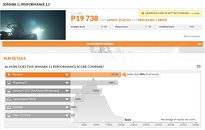

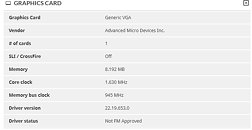
The folks at Videocardz have put together an interesting chart detailing the 687F:C1 RX Vega's score history since benchmarks of it first started appearing, around three months ago. This chart shows an impressive performance improvement over time, with AMD's high-performance GPU contender showing an improvement of roughly 15% since it was first benchmarked. That averages out at around a 5% improvement per month, which bodes well for the graphics card... At least in the long term. We have to keep in mind that this video card brings with it some pretty extensive differences from existing GPU architectures in the market, with the implementation of HBC (High Bandwidth Cache) and HBCC (High Bandwidth Cache Controller). These architectural differences naturally require large amounts of additional driver work to enable them to function to their full potential - full potential that we aren't guaranteed RX Vega GPUs will be able to deliver come launch time.
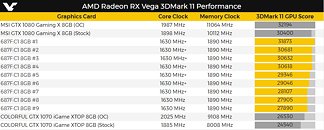
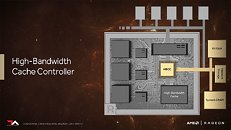
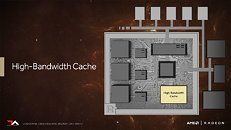
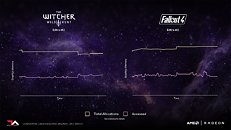
View at TechPowerUp Main Site



The folks at Videocardz have put together an interesting chart detailing the 687F:C1 RX Vega's score history since benchmarks of it first started appearing, around three months ago. This chart shows an impressive performance improvement over time, with AMD's high-performance GPU contender showing an improvement of roughly 15% since it was first benchmarked. That averages out at around a 5% improvement per month, which bodes well for the graphics card... At least in the long term. We have to keep in mind that this video card brings with it some pretty extensive differences from existing GPU architectures in the market, with the implementation of HBC (High Bandwidth Cache) and HBCC (High Bandwidth Cache Controller). These architectural differences naturally require large amounts of additional driver work to enable them to function to their full potential - full potential that we aren't guaranteed RX Vega GPUs will be able to deliver come launch time.




View at TechPowerUp Main Site
Last edited by a moderator:




 . Since it is not NV we don't know how far we can push it. Although it's just my wishing for it to run1800Mhz. Chances for this are practically none. Well who knows. Just saying it would be interesting.
. Since it is not NV we don't know how far we can push it. Although it's just my wishing for it to run1800Mhz. Chances for this are practically none. Well who knows. Just saying it would be interesting. 


